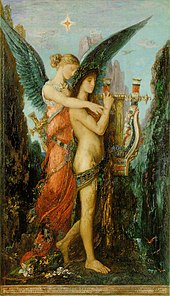Melpomene

Melpomene ( ancient Greek Μελπομένη Melpomenē , the singing one; emphasis in Latin and German on the second syllable: Melp o mene) is one of the nine muses . She is the muse of tragic poetry and funeral song. Its symbols are the tragic mask in one hand and a club in the other, as well as a main wreath with vine leaves.
Like her sisters, the eight other muses, she is the daughter of Zeus and Mnemosyne .
Melpomene has seen a lot of misery and suffering over the course of time and through her singing helps to transport new strength into the human spirit so that it ultimately triumphs. She thus acts as a guide to face the calamities of the storms of life .
Melpomenes crying mask and the laughing mask of her sister Thalia serve together as a symbol of dramatic theater or (e.g. on city maps) as a pictogram for cultural establishments in general.
Melpomene as a motif in art and literature
art
From 1905, after winning a competition, Paco Durrio created a monument for the musician Juan Crisóstomo de Arriaga in Bilbao, a sculpture that does not represent the person but the muse Melpomene. Possibly because of this novelty or because of the unusual depiction of the naked figure, it was not installed until 1933.
Literary works
- Michael von Jung : Melpomene or Grablieder , Ottobeuren 1839 ( full text in the Wikisource project , under construction)
Musical works
- George Whitefield Chadwick : Melpomene. Dramatic Overture , 1887
- Václav Pichl (1741–1805): Symphony in B flat major ( Melpomene )
literature
- Michael Leopold Enk von der Burg : Melpomene or about the tragic interest . Vienna 1827.
Web links
Individual evidence
- ↑ Melpomene ( Memento of February 13, 2017 in the Internet Archive ), bilbaoartdistrict.com, accessed on February 12, 2017
- ↑ George Whitefield Chadwick: Melpomene , musikmph.de, accessed on May 1, 2019
